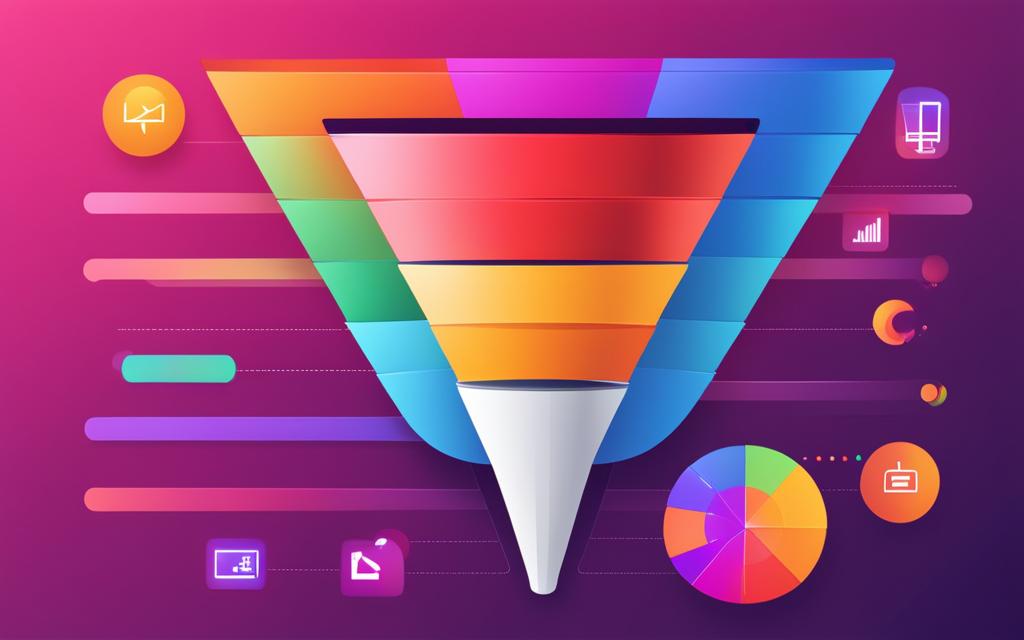Lead generation is a vital aspect of any business’s marketing strategy. It involves attracting potential customers and converting them into leads, ultimately driving growth and revenue. A lead generation approach refers to the strategies and techniques businesses use to generate interest and capture contact information from prospects.
There are various lead generation strategies and techniques that businesses can employ. These can include content marketing, social media marketing, email marketing, paid advertising, and partnering with lead generation companies. Each approach has its unique benefits and can be tailored to suit the specific needs and goals of a business.

Key Takeaways:
- A lead generation approach is essential for attracting and converting potential customers into leads.
- There are various strategies and techniques businesses can utilize, such as content marketing, social media marketing, email marketing, paid advertising, and partnering with lead generation companies.
- Tailoring the lead generation approach to the specific needs and goals of the business is crucial.
- Continuous analysis and optimization of lead generation strategies are key to maximizing effectiveness.
- Implementing an effective lead generation approach is vital for business growth and success.
What is a Lead?
A lead is a person who shows interest in a company’s product or service by providing their contact information. Leads play a crucial role in the sales and marketing process, as they represent potential customers who have shown some level of interest or engagement.
When it comes to lead generation, not all leads are equal. There are different types of leads that businesses categorize based on their level of qualification and their position in the buying process.
Lead Types:
1. Marketing Qualified Lead (MQL):
An MQL is a lead that has engaged with marketing efforts, such as visiting a website, downloading an e-book, or subscribing to a newsletter. However, they may not be ready for a sales call or immediate conversion.
2. Sales Qualified Lead (SQL):
A SQL is a lead that has taken specific actions indicating their interest in becoming a paying customer. These actions can include requesting a demo, signing up for a free trial, or adding items to a shopping cart.
3. Product Qualified Lead (PQL):
A PQL is a lead that has used a company’s product or service and has expressed an interest in becoming a paying customer. This type of lead is often seen in SaaS (Software as a Service) businesses where users sign up for a free trial before converting into paying customers.
4. Service Qualified Lead (SQL):
An SQL is a lead or existing customer who has interacted with customer service and expressed an interest in becoming a paying customer. This can happen through customer support chats, phone calls, or other forms of communication.
Understanding the different types of leads can help businesses tailor their marketing and sales efforts to specific segments, increasing the likelihood of converting leads into customers.
| Lead Type | Description |
|---|---|
| Marketing Qualified Lead (MQL) | Engaged with marketing efforts but not ready for a sales call |
| Sales Qualified Lead (SQL) | Taken actions indicating interest in becoming a paying customer |
| Product Qualified Lead (PQL) | Used the product and expressed interest in becoming a paying customer |
| Service Qualified Lead (SQL) | Indicated interest in becoming a paying customer through customer service interactions |
What is Online Lead Generation?
Online lead generation is a crucial aspect of modern business strategies, allowing companies to attract and capture potential customers through various online channels and platforms. By utilizing effective lead generation strategies and tools, businesses can optimize their online presence and maximize their lead generation efforts.
Online lead generation involves implementing a range of digital marketing tactics to generate interest in products or services, and ultimately convert that interest into leads. These strategies can include:
- Content Marketing: Creating and sharing valuable, informative content such as blog posts, articles, and ebooks to attract and engage prospects.
- Social Media Marketing: Leveraging social media platforms to connect with target audiences, build brand awareness, and capture leads through targeted campaigns and engaging content.
- Email Marketing: Building a subscriber list and nurturing leads through personalized email campaigns, providing valuable information and offers to encourage conversions.
- Paid Advertising: Using online advertising platforms like Google Ads and social media ads to target specific audiences and drive traffic to landing pages designed to capture leads.
These online lead generation strategies can be supplemented with a variety of tools and technologies that help businesses streamline their lead generation efforts. These tools can provide valuable insights, automate processes, and optimize the overall lead generation process. Some popular lead generation tools include:
- Lead Capture Forms: Tools that allow businesses to easily create and embed lead capture forms on their websites to collect contact information from interested prospects.
- CRM Systems: Customer Relationship Management (CRM) systems that help businesses manage and track leads throughout the lead generation and sales process.
- Analytics Platforms: Tools that provide in-depth analytics and metrics to measure the effectiveness of lead generation strategies and identify areas for improvement.
- Marketing Automation: Platforms that automate repetitive marketing tasks, such as sending follow-up emails and nurturing leads, allowing businesses to scale their lead generation efforts.
By leveraging online lead generation strategies and utilizing the right tools, businesses can effectively reach their target audiences, capture valuable leads, and drive growth and revenue.

Why is Lead Generation Important?
Lead generation plays a crucial role in the success of businesses, driving customer acquisition, revenue growth, and overall business expansion. By effectively implementing lead generation strategies and following best practices, businesses can attract potential customers, nurture relationships, and build a robust sales pipeline.
One of the main reasons why lead generation is important is its ability to attract potential customers. Through various marketing channels and techniques, businesses can capture the attention of their target audience and generate interest in their products or services. This allows them to establish meaningful connections with potential customers who have the potential to convert into paying customers.
“Effective lead generation is not just about generating any leads; it’s about generating quality leads that have a higher likelihood of converting into customers.”
By focusing on effective lead generation, businesses can ensure that the leads they generate are of high quality and are more likely to convert. This involves following industry best practices and implementing strategies that align with the target audience’s needs and preferences. By attracting qualified leads, businesses can save time and resources by focusing their efforts on prospects with a genuine interest in their offerings.
Moreover, lead generation helps businesses build a strong sales pipeline. By consistently nurturing leads and guiding them through the sales funnel, businesses can turn interested prospects into paying customers. This ensures a steady stream of potential buyers and contributes to the long-term sustainability and growth of the organization.
Benefits of Effective Lead Generation:
- Increased customer acquisition: Lead generation helps businesses acquire new customers and expand their customer base.
- Improved conversion rates: By focusing on quality leads, businesses can increase their conversion rates and maximize their return on investment.
- Enhanced brand awareness: Lead generation activities increase brand exposure, allowing businesses to reach a larger audience and establish their authority in the industry.
- Higher revenue generation: With a strong sales pipeline and qualified leads, businesses can drive revenue growth and achieve their financial goals.
- Opportunity for customer relationship building: Lead generation provides an opportunity to nurture relationships with potential customers, resulting in long-term customer loyalty and repeat business.
Overall, effective lead generation is essential for businesses that aim to thrive in today’s competitive market. By implementing best practices and focusing on attracting and nurturing quality leads, businesses can unlock new opportunities, drive growth, and stay ahead of the competition.
Key Components of Effective Lead Generation
| Component | Description |
|---|---|
| Target audience identification | Defining the ideal customer profile and identifying the characteristics and preferences of the target audience. |
| Compelling offers | Creating irresistible offers and incentives that motivate potential customers to take action and provide their contact information. |
| Landing page optimization | Designing and optimizing landing pages with persuasive copy and clear calls-to-action to capture leads effectively. |
| Lead capture forms | Implementing user-friendly and intuitive lead capture forms that collect the necessary information without causing friction. |
| Personalized marketing efforts | Tailoring marketing messages and communications to the specific needs and interests of individual leads. |
| Continuous testing and optimization | Regularly analyzing lead generation strategies, experimenting with new approaches, and optimizing campaigns for maximum effectiveness. |
Lead Generation Strategies and Techniques
When it comes to generating leads, businesses have a wide range of strategies and techniques at their disposal. By leveraging these approaches effectively, companies can attract and convert potential customers into valuable leads. Let’s explore some of the most effective lead generation strategies and techniques:
1. Content Marketing: Content marketing involves creating and distributing high-quality content that educates and engages the target audience. This can include blog posts, articles, videos, and infographics. By providing valuable information, businesses can attract prospects who are interested in their products or services.
2. Social Media Marketing: Social media platforms offer a wealth of opportunities for lead generation. By engaging with the target audience through content, conversations, and targeted ads, businesses can capture the interest of potential leads and direct them to their website or landing pages.
3. Email Marketing: Email marketing remains a powerful tool for lead generation. With a well-crafted email campaign, businesses can nurture leads, build relationships, and drive conversions. Personalization and automation can enhance the effectiveness of email marketing efforts.
4. Paid Advertising: Paid advertising, such as search engine advertising and display advertising, allows businesses to reach a wider audience and target specific demographics. By optimizing ad campaigns and targeting relevant keywords, businesses can increase their lead generation potential.
5. Partnering with Lead Generation Agencies: Collaborating with lead generation agencies can provide businesses with specialized expertise and resources to maximize their lead generation efforts. These agencies have access to extensive networks and can help businesses identify and engage with potential leads effectively.
6. Creating a Lead Generation Funnel: A lead generation funnel is a systematic process that guides prospects through different stages of the buying journey. By nurturing leads and providing valuable content at each stage, businesses can increase their chances of converting leads into customers.

By implementing these lead generation strategies and techniques, businesses can create a robust lead generation system that drives continuous growth and expands their customer base.
| Lead Generation Strategy | Description |
|---|---|
| Content Marketing | Creating and distributing valuable content to attract potential leads. |
| Social Media Marketing | Engaging with the target audience through social media platforms. |
| Email Marketing | Nurturing leads and building relationships through targeted email campaigns. |
| Paid Advertising | Reaching a wider audience through paid search engine and display advertising. |
| Partnering with Lead Generation Agencies | Collaborating with specialized agencies to maximize lead generation efforts. |
| Creating a Lead Generation Funnel | Guiding prospects through different stages of the buying journey. |
Best Practices for Lead Generation
To optimize lead generation efforts and achieve better results, businesses should implement the following best practices:
- Define Target Audiences: Identify your target market and create buyer personas to understand their demographics, needs, and pain points. This will help you tailor your lead generation strategies and messages to effectively reach and engage your ideal audience.
- Create Compelling Offers: Develop irresistible offers such as valuable content, exclusive discounts, free trials, or consultations that entice prospects to provide their contact information. Make sure your offers address your target audience’s specific challenges and provide solutions.
- Optimize Landing Pages: Design visually appealing and user-friendly landing pages that clearly communicate the value of your offer and include a prominent and persuasive call-to-action. Optimize the page for SEO by using relevant keywords and ensuring fast loading times.
- Use Lead Capture Forms Effectively: Keep your lead capture forms simple and concise to increase conversion rates. Only ask for essential information and clearly communicate the benefits of submitting the form.
- Personalize Marketing Efforts: Tailor your marketing messages and communications based on the buyer’s journey and specific interests and preferences of your leads. Use their first names in emails or provide personalized recommendations to build rapport and trust.
- Continuously Test and Optimize: Regularly evaluate your lead generation strategies, metrics, and performance. Test different approaches, messages, and channels to identify what works best for your business. Use A/B testing to compare different variations and iterate based on the data.
By following these best practices, businesses can enhance their lead generation efforts, attract high-quality leads, and increase the chances of converting them into loyal customers. Stay proactive and adaptable to stay ahead in the competitive landscape of lead generation.
Conclusion
Lead generation plays a crucial role in driving business growth and achieving marketing success. By implementing effective lead generation strategies and techniques, businesses have the opportunity to attract, engage, and convert prospects into valuable leads, ultimately boosting revenue and fostering long-term growth.
However, it is essential for businesses to continuously analyze and optimize their lead generation processes to ensure maximum effectiveness. This involves closely monitoring key performance indicators, conducting thorough data analysis, and making data-driven decisions to improve conversion rates and overall lead quality.
To achieve effective lead generation, businesses should focus on creating compelling offers, utilizing various channels such as content marketing and social media marketing, optimizing landing pages, and employing lead capture forms strategically. Additionally, personalizing marketing efforts and continuously testing and optimizing lead generation strategies can further enhance results.
By embracing the lead generation process and implementing best practices, businesses can successfully generate high-quality leads, nurture relationships with prospects, and ultimately drive sustainable business growth and success.
FAQ
What is lead generation approach?
Lead generation approach refers to the strategies and techniques used to attract prospects and convert them into leads for a business. This can include various marketing efforts such as content marketing, social media marketing, email marketing, and paid advertising. Many businesses also partner with lead generation companies to help implement effective lead generation strategies.
What is a lead?
A lead is a person who shows interest in a company’s product or service by providing their contact information. There are different types of leads based on their qualification and where they are in the buying process. Marketing qualified leads have engaged with marketing efforts but may not be ready for a sales call. Sales qualified leads have taken actions indicating their interest in becoming paying customers. Product qualified leads have used the product and expressed interest in becoming paying customers. Service qualified leads have indicated their interest in becoming paying customers through customer service interactions.
What is online lead generation?
Online lead generation refers to the process of generating leads through various online channels and platforms. This can include strategies such as content marketing, social media marketing, email marketing, and paid advertising. Businesses can also utilize lead generation tools to optimize their online lead generation efforts.
Why is lead generation important?
Lead generation is important for businesses because it helps attract potential customers, build the sales pipeline, and drive business growth. Effective lead generation involves implementing best practices to ensure that the leads generated are of high quality and have a higher likelihood of converting into customers.
What are lead generation strategies and techniques?
Lead generation strategies and techniques are approaches used by businesses to generate leads. These can include content marketing, social media marketing, email marketing, paid advertising, and partnering with lead generation agencies. Businesses often create a lead generation funnel to guide prospects through different stages of the buying process.
What are the best practices for lead generation?
Best practices for lead generation include defining target audiences, creating compelling offers, optimizing landing pages, using lead capture forms effectively, personalizing marketing efforts, and continuously testing and optimizing lead generation strategies. These practices help maximize the effectiveness of lead generation efforts.
What is the conclusion?
Lead generation is a crucial aspect of business growth and marketing success. By implementing effective lead generation strategies and techniques, businesses can attract and convert prospects into leads, ultimately driving revenue and growth. It is important to continuously analyze and optimize lead generation processes to ensure maximum effectiveness.